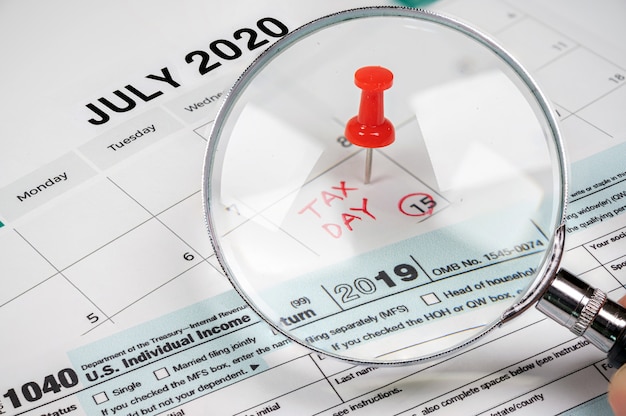New IRS Tax Law Changes for 2025: Key Updates You Need to Know

New IRS Tax Law Changes for 2025: What You Need to Know Now encompasses significant adjustments that could impact individual tax returns, potentially affecting various aspects of income, deductions, and credits, thereby requiring taxpayers to stay informed to optimize their financial strategies.
Staying ahead of tax law changes is crucial for effective financial planning. The new IRS tax law changes for 2025: what you need to know now includes several updates that could impact your tax liability. This article breaks down these changes, helping you understand how they might affect your financial situation.
Understanding the Shifting Tax Landscape for 2025
The tax landscape is always evolving, and 2025 is set to bring significant changes. These changes result from both legislative actions and adjustments made by the IRS to keep pace with economic shifts.
Understanding these shifts is key to effective tax planning. Knowing what to expect allows you to adjust your financial strategies accordingly and potentially minimize your tax burden.
Key Areas Affected by the New Tax Laws
Several specific areas will see changes in 2025. These adjustments could affect everything from your standard deduction to the tax brackets that apply to your income.
- Standard Deduction Adjustments: The standard deduction, which many taxpayers use to reduce their taxable income, is likely to be adjusted for inflation.
- Tax Bracket Modifications: The income thresholds for each tax bracket could also shift, potentially impacting how much tax you pay.
- Changes to Credits and Deductions: Certain tax credits and deductions may be expanded, reduced, or phased out altogether.
Staying informed about these specific changes can help you make proactive decisions. Consult with a tax professional to fully understand the implications of these adjustments for your unique financial situation.
Major Tax Provisions Expiring in 2025
Several key provisions of the Tax Cuts and Jobs Act (TCJA) of 2017 are scheduled to expire at the end of 2025. This expiration will bring significant changes to many taxpayers’ financial situations.
Understanding which tax breaks are expiring is important. This knowledge allows individuals and businesses to plan ahead and potentially take advantage of these provisions before they disappear.

Potential Scenarios if the Provisions Expire
If Congress does not act to extend or modify these provisions, several scenarios could unfold. These scenarios would affect individual taxpayers, businesses, and the economy as a whole.
- Individual Tax Rates: Individual income tax rates are set to revert to pre-TCJA levels, potentially increasing taxes for many.
- Child Tax Credit: The enhanced Child Tax Credit could be reduced, impacting families with children.
- Estate Tax: The estate tax exemption is scheduled to decrease, potentially affecting wealthy individuals and their estate planning strategies.
The expiration of these provisions could have far-reaching consequences. Engage in discussions with financial advisors and tax professionals to prepare for these potential shifts and adjust your strategies accordingly.
How the Standard Deduction Could Change
The standard deduction is a set dollar amount that taxpayers can deduct from their adjusted gross income (AGI) to reduce their tax liability. The IRS typically adjusts this amount annually to account for inflation.
Understanding how the standard deduction might change is crucial. This knowledge will allow taxpayers to anticipate how their tax liability might be affected.
Projected Standard Deduction Amounts for 2025
Based on current inflation trends, experts are projecting potential standard deduction amounts for 2025. These projections can help taxpayers estimate their tax liability in advance.
For example, if inflation continues at its current rate:
- Single Filers: The standard deduction for single filers could increase to around $14,500.
- Married Filing Jointly: For married couples filing jointly, the standard deduction could rise to about $29,000.
- Heads of Household: Heads of household might see their standard deduction increase to approximately $21,750.
These numbers are subject to change based on the actual inflation rate. Taxpayers should monitor official IRS announcements for the final amounts.
Adjustments to Tax Brackets and Income Thresholds
Tax brackets define the income ranges at which different tax rates apply. The IRS adjusts these brackets annually to prevent “bracket creep,” where inflation pushes people into higher tax brackets even though their real income hasn’t increased.
Staying informed about these adjustments is essential. Bracket creep can significantly impact your tax bill if not properly accounted for.

Understanding Bracket Inflation Adjustments
The annual inflation adjustments can subtly but significantly alter your tax liability. The IRS uses the Consumer Price Index (CPI) to determine these adjustments.
Without these adjustments, inflation would effectively increase your tax burden. The annual adjustments ensure that you are not taxed at a higher rate simply because of inflation.
Impact on Different Income Levels
The adjustments to tax brackets will affect taxpayers differently depending on their income level. Understanding these nuances is critical for proper tax planning.
- Low-Income Earners: May see a smaller portion of their income taxed at higher rates.
- Middle-Income Earners: Could experience modest savings due to bracket adjustments.
- High-Income Earners: Might find that a larger portion of their income falls into lower tax brackets.
Keep an eye on the official IRS announcements for the final tax bracket adjustments. Consult with a financial advisor to explore how these changes might affect your overall financial strategy.
Impact on Tax Credits and Deductions
Tax credits and deductions are powerful tools for reducing your tax liability. Credits directly reduce the amount of tax you owe, while deductions reduce your taxable income.
Understanding how these credits and deductions might change is crucial. Many tax credits and deductions are subject to periodic reviews and adjustments by Congress and the IRS.
Potential Increase in Electric Vehicle Tax Credits
The electric vehicle (EV) tax credit is one area that could see significant changes in 2025. The government may extend or expand this credit to encourage the adoption of electric vehicles.
- Current Credit: Currently, the EV tax credit offers a certain amount of tax relief for those who purchase new electric vehicles.
- Potential Changes: The credit could be extended to used EVs or increased in value to further incentivize adoption.
- Eligibility Requirements: Keep an eye on potential changes to eligibility requirements, such as income limits or vehicle specifications.
These changes could make electric vehicles more accessible to a wider range of consumers.
Changes to Child and Dependent Care Tax Credit
The Child and Dependent Care Tax Credit is another area to watch. This credit helps offset the costs of childcare for working parents.
Potential changes might include:
- Increased Credit Amount: The amount of the credit could increase, providing greater relief to families.
- Expanded Eligibility: The eligibility requirements might be relaxed to include more families.
- Inflation Adjustments: The credit could be adjusted for inflation to maintain its value over time.
Consult with a tax professional to explore how these changes might affect your family’s tax situation.
Strategies for Tax Planning in Light of the Changes
As the tax laws evolve, effective tax planning becomes even more important. There are several strategies you can use to minimize your tax liability and maximize your financial well-being.
Having a well-thought-out plan can make a significant difference. Consider consulting with a tax professional to develop a personalized tax strategy.
Maximize Retirement Contributions
Contributing to retirement accounts like 401(k)s and IRAs can offer significant tax benefits. These contributions are often tax-deductible and can help reduce your taxable income.
Review Investment Strategies
Reviewing your investment strategies is another important step. Consider the tax implications of your investments and make adjustments as needed to minimize your tax burden.
- Tax-Loss Harvesting: This involves selling investments that have lost value to offset capital gains.
- Asset Location: This strategy involves placing tax-efficient investments in taxable accounts and tax-inefficient investments in tax-advantaged accounts.
Consult with a Tax Professional
The most effective strategy is to consult with a qualified tax professional. A tax advisor can provide personalized guidance based on your unique financial situation.
By staying informed about the new IRS tax law changes for 2025: what you need to know now, you can proactively manage your tax liability and make informed financial decisions.
| Key Aspect | Brief Description |
|---|---|
| 💰 Expiring Tax Provisions | Key TCJA provisions are set to expire, potentially raising individual income tax rates. |
| 📈 Standard Deduction | The standard deduction is projected to increase due to inflation adjustments. |
| 📊 Tax Brackets | Tax brackets will be adjusted to prevent bracket creep, impacting different income levels. |
| 🚗 Electric Vehicle Credit | Potential changes to the EV tax credit to encourage adoption, possibly including used EVs. |
Frequently Asked Questions (FAQ)
▼
Significant changes expected include expiring provisions from the Tax Cuts and Jobs Act, adjustments to standard deductions, modifications to tax brackets, and potential alterations to tax credits and deductions.
▼
The standard deduction is projected to increase due to annual inflation adjustments. Specific amounts will vary for single filers, married couples, and heads of household, as determined by the IRS.
▼
If the TCJA provisions expire, individual tax rates are set to revert to pre-2018 levels, the enhanced Child Tax Credit could be reduced, and the estate tax exemption is scheduled to decrease.
▼
Tax brackets are adjusted annually to prevent “bracket creep,” where inflation pushes people into higher tax brackets even if their real income hasn’t increased. The IRS uses the Consumer Price Index (CPI) for these adjustments.
▼
Strategies include maximizing retirement contributions, reviewing investment strategies for tax efficiency (such as tax-loss harvesting), and consulting with a qualified tax professional to develop a personalized plan.
Conclusion
Staying informed about the new IRS tax law changes for 2025: what you need to know now is essential for effective financial planning. By understanding these changes and proactively adjusting your strategies, you can minimize your tax liability and maximize your financial well-being. Be sure to consult with a tax professional for personalized guidance.






